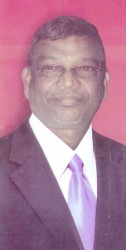Paramountcy of the then ruling People’s National Congress (PNC) party over the state pushed historian Walter Rodney to end the enabling cycle of fear and oppression and he in turn suffered an undeserved death carried out by the Forbes Burnham Regime, Labour Minister Nanda Gopaul testified yesterday.
Gopaul, who is also the former General Secretary of the National Association of Agricultural, Commer-cial and Industrial Employees (NAACIE), made the proclamation during his second day on the stand before the Commission of Inquiry (COI) into Rodney’s death at the Supreme Court Law Library.
He further stated his belief that then president Burnham played a role in Rodney’s death.
According to Gopaul, the PNC displayed obvious signs of paramountcy over the state by placing its flag on the building of the Court of Appeal. Gopaul further said that a number of security personnel, including the former Commissioner of Police Lloyd Barker and former Chief of the Guyana Defence Force Norman McLean were in attendance at the PNC’s biennial congress. Their attendance, he said, was out of the norm.
He explained, “I’ve never seen anywhere else where the Chief of Staff in uniform and the Commissioner of Police in uniform would attend a party congress or a party function.”
He went on, “If it was a government function being addressed by the Prime Minister, it would have been a different story but this is a political party function.”

Gopaul believed that the flag’s placement on the Court of Appeal was meant to send a message to Guyanese that “the PNC was in control of the courts of the country and we better taking warning.” He went on to say that the high-ranking security personnel’s attendance at the PNC’s congress gave him the impression that there was complete control by the PNC of these agencies that are supposed to protect the people.
According to Gopaul, the PNC sought to have every agency associated with it, including trade unions, major insurance companies and banks, while the state denied the people’s basic rights. These rights, he indicated, included the freedom of expression, freedom to receive information, and the freedom of association.
Guyanese who were opposed to the PNC were also subject to harassment through threats and the break-up of their peaceful protests and the state-owned media were used to further oppress. All of these, Gopaul believed, were clear signs of paramountcy by the PNC and subsequently pushed Rodney to address the issue.
“It was clearly a situation where there was massive oppression of the people… it was an indication that the state had absolute control over the lives of the people; there was absolute fear and Rodney sought to break that cycle of fear, oppression and discrimination,” Gopaul said.
Gopaul stated that Rodney tried to break this cycle of fear by holding meetings and making public statements to large gatherings of Guyana. Gopaul further said that this tactic was unseen prior to Rodney.
According to Gopaul, Rodney was “assassinated by the leadership of the PNC and Burnham had a hand in that assassination.” He further said that the PNC either acted by itself or in collusion with the security forces of Guyana.
Gopaul said he learnt of Rodney’s death from the news and said that he never knew anyone by the name of Gregory Smith, who is accused of killing Rodney. However, he said, he had seen reports in newspapers with the photos of Smith subsequent to Rodney’s death.
Following Rodney’s death, NAACIE organised and mobilised a march with thousands of persons and Gopaul explained that he had not been fearful but rather angry.
He said, “The life of a brilliant son – someone who was loved by many – had been snuffed out.” He continued, “We must see what happened to Dr. Rodney as something that should never, ever happen in this country ever, ever, again and that this should be a lesson.”
Meanwhile, Gopaul denied, under cross-examination by PNCR attorney Basil Williams, that he had been enlisted by the Working People’s Alliance (WPA) to take part in a civil rebellion.
He explained that the WPA viewed the trade unions as vital in the struggle to remove the government of the day; however, he said, he was unaware of any possible interest in the party overthrowing the government.
He further said that he never heard Rodney say that the PNC government “must go by any mean’s necessary.”
Gopaul is expected to continue his testimony today, when he will undergo further cross-examination.
Rodney, a co-leader of the WPA, was killed in a car along John and Bent streets on June 13, 1980 when a walkie-talkie given to him exploded in his lap.




